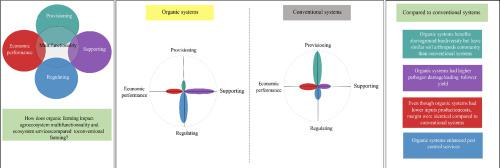Agricultural Systems ( IF 6.1 ) Pub Date : 2022-09-08 , DOI: 10.1016/j.agsy.2022.103489 Noémie Ostandie , Brice Giffard , Pauline Tolle , Adeline Alonso Ugaglia , Denis Thiéry , Adrien Rusch

|
CONTEXT
Assessing the multifunctionality of agroecosystems is crucial to design more sustainable farming systems. While it is known that organic farming benefits biodiversity and ecosystem services, how organic farming affects their multifunctionality, including agronomical, ecological as well as economic dimensions, remains poorly explored.
OBJECTIVE
In this study, we investigated how individual indicators regrouped into agroecosystem goods of vineyards respond to farming systems and landscape composition. We also explored how ecosystem services resulting from agroecosystem goods respond to farming systems and landscape composition. In addition, we evaluated trade-offs and synergies between agroecosystem goods as well as between ecosystem services for each farming systems.
METHOD
We quantified 14 indicators corresponding to five agroecosystem goods (biodiversity conservation, soil organic matter decomposition, pest control, wine production, margin) in 20 pairs of organic and conventional vineyards.
RESULTS AND CONCLUSION
Our study reveals that organic farming did not improve agroecosystem multifunctionality compared to conventional farming but led to lower trade-offs between agroecosystem goods. We found that organic systems increase supporting and regulating services but had lower provisioning service compared to conventional systems. Indeed, organic vineyards had multiple beneficial effects including higher pest control, lower production costs but produced less wine. Our results indicate a strong trade-off between pest control and wine production in both systems. In addition, conventional systems supported a negative trade-off between biodiversity conservation and wine production which was not the case of organic systems.
SIGNIFICANCE
Our study provides key information to further design farming systems that combine ecological, economical and agronomical performances. Further investigations are now needed to identify which combined management options maximize multiple performance of agroecosystems independently of certifications and across scales.
中文翻译:

有机葡萄栽培可降低农业生态系统产品之间的权衡取舍,但不会提高整体多功能性
语境
评估农业生态系统的多功能性对于设计更可持续的农业系统至关重要。虽然众所周知,有机农业有益于生物多样性和生态系统服务,但有机农业如何影响其多功能性,包括农艺、生态和经济方面,仍然缺乏探索。
客观的
在这项研究中,我们调查了重新组合成葡萄园农业生态系统产品的单个指标如何响应农业系统和景观构成。我们还探讨了由农业生态系统产品产生的生态系统服务如何响应农业系统和景观构成。此外,我们评估了农业生态系统产品之间以及每个农业系统的生态系统服务之间的权衡和协同作用。
方法
我们量化了 20 对有机和常规葡萄园中五种农业生态系统产品(生物多样性保护、土壤有机质分解、害虫防治、葡萄酒产量、利润)对应的 14 项指标。
结果与结论
我们的研究表明,与传统农业相比,有机农业并没有提高农业生态系统的多功能性,而是降低了农业生态系统产品之间的权衡取舍。我们发现,与传统系统相比,有机系统增加了支持和调节服务,但提供服务较低。事实上,有机葡萄园具有多种有益效果,包括更高的害虫控制、更低的生产成本,但生产的葡萄酒更少。我们的结果表明,两个系统中的害虫控制和葡萄酒生产之间存在很强的权衡。此外,传统系统支持生物多样性保护和葡萄酒生产之间的负面权衡,而有机系统并非如此。
意义
我们的研究为进一步设计结合生态、经济和农艺性能的农业系统提供了关键信息。现在需要进一步调查以确定哪些组合管理方案可以最大限度地提高农业生态系统的多重性能,而不受认证和跨规模的影响。











































 京公网安备 11010802027423号
京公网安备 11010802027423号